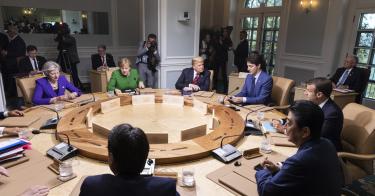As a theatrical production, last weekend's G-7 had it all: young French knights unhorsed in a joust; Wagnerian heroines sinking into despair; and the King's privy councilors bellowing about betrayal, backstabbing and burning in hell.
But there was one thing even more unsettling than all the sturm und drangover the Trump administration's rejection of the G-7 Communiqué: the document itself. Its plot can be summed up in three little words: "tax and spend."
Yes, the clash over trade policy is deeply concerning. Hopefully the posturing and tariff threats will be of short duration — and the solution to the (thus far mostly theoretical) trade war will not involve any new "plurilateral" and "inclusive" agreements (to quote the Communiqué).
And there was one positive in the Communiqué: language demonstrating solidarity on North Korea, Russia, Syria, and terrorism, as well as talk of unity in the face of threats to world peace by China and Iran. One of the main reasons the G-7 was established was for the mutual security of the Western market democracies.
But a careful examination of the rest of the Communiqué — and how it would affect American taxpayers — leads to just one question: Why did it take Trump so long to reject it?
Code words embedded in key sections of the Communiqué should set off alarm bells:
- "Our strong determination to achieve a clean environment, clean air and clean water."
This chestnut appears in every Communiqué. And civil servants and politicians in every G-7 nation regularly cite them to justify more government spending on the problem. For them, the condition of the environment is always a sign of market failure rather than an opportunity for market-based solutions.
The Communiqué also doubled down on the Paris Climate Agreement, an ineffective but costly pact from which the U.S. wisely exited last year. The agreement would not have made a dint on global temperatures. However, as my Heritage Foundation colleague Nicolas Loris has noted, it would open the door to "egregious regulation, cronyism, and government spending that would have been as disastrous for the American economy as it is proving to be for those in Europe."
- "Work together in creating a healthy, prosperous, sustainable and fair future for all."
Who is to decide what is "fair?' Again the Communiqué tilts away from a freemarket and toward whatever the state decides constitutes "fairness."
- "Ensure that everyone pays their fair share" by supporting "international efforts to deliver fair, progressive, effective and efficient tax systems."
There's the word "fair" again. What does it mean? Well, the Communiqué supports an OECD proposal aimed at centralizing and "harmonizing" global tax rules. By harmonizing, they mean raising effective tax rates on international firms to European levels — not lowering them to levels more compatible with economic growth. Naturally, most of the firms affected would be American. Odd, how the G-7 focuses only on collecting more taxes, never on cutting taxes and reducing government spending.
- Promote strong, sustainable, and "evidence-based health care"
Evidence from where? Sustained by whom? Such loaded phrases practically beg for preordained, politically correct answers that leave little room for solutions other than very expensive statist health care.
- "Work toward the achievement of the Sustainable Development Goals of the 2030 Agenda"
As Jeffrey Smith and Alex Gladstein recently noted in Quartz Africa, Western policies and programs aimed at achieving the UN's SDG goals carefully avoid mention of concepts such as corruption, genuine human rights, and real functioning democracy. The unfortunate, practical result is to bolster the power of authoritarian dictatorships in sub-Saharan Africa and elsewhere. They know that, by merely paying lip service to lofty SDG goals, they will appease any serious efforts to rescue the roughly 4 billion people under their rule.
The American people need relief from recklessly expanding federal spending and the leviathan state it supports. Much of the G-7 Communiqué, on the other hand, reads like a blueprint for ever bigger government.
President Trump's decision not to endorse it was the right one. Perhaps other G-7 leaders will re-examine its underlying assumptions and present a more prudent and fiscally balanced set of recommendations next year.
This piece originally appeared in Investors Business Daily



